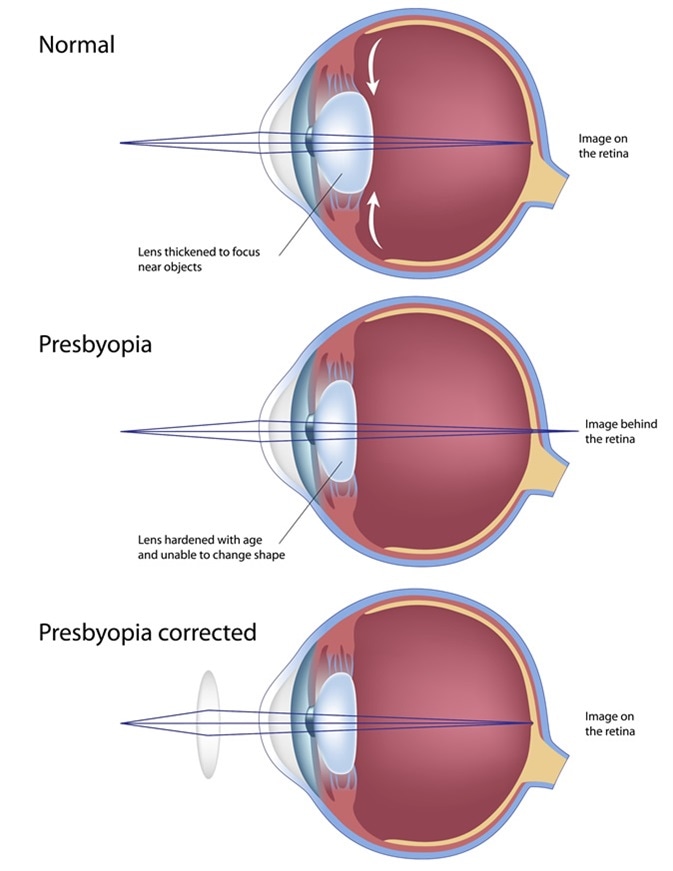Presbyopia is a medical condition that presents with a loss of the ability to see objects in the near distance clearly. It is a gradual and progressive problem that typically manifests in the fifth decade of life.
Everyone, even those who have had 20/20 vision their entire lives, will develop presbyopia. It is believed to be due to the hardening and loss of elasticity in the lens as we age.
This process makes it increasingly more difficult for the person to focus on objects that are held at normal reading distance from the eyes.
Diagnosis is generally by a comprehensive eye examination, which includes evaluation of the retina as well as refraction, slit-lamp examination, and testing of muscle integrity, visual field and visual acuity. Management of presbyopia may be nonsurgical or surgical.
Nonsurgical treatment involves the use of eyeglasses and contact lenses, while surgical treatment may be done through refractive surgery, corneal inlays or lens implants.
While the condition itself is capable of causing significant complications for the patient, adverse effects may also come of treating it. Most notably, the highest risk of complications is associated with surgical intervention.

Eye condition Presbyopia. Image Credit: Alila Medical Media / Shutterstock
Condition-Related Complications
Our eyes need to accommodate properly in order for us to conduct near vision tasks. For example, reading, an important aspect of our everyday lives, is not entirely possible without an adequate accommodation response.
Whether it is reading or threading a needle, near vision tasks become harder when our eyes lose their youthful ability to readily accommodate from far to near vision.
This puts a strain on the eyes and this in turn causes fatigue and headaches. Furthermore, many persons note blurred vision and a worsening of symptoms when tired or in dim light.
These could all have a negative impact on the affected person’s life, especially if they have a job that requires constant near vision focusing (e.g. computer-related work).
Treatment-Associated Complications
Surgical treatment of presbyopia may cause complications. This is to be expected, because it is almost impossible to perform any kind of surgery without associated risks and/ or complications. Patients need not be alarmed though, because in most cases, there are no serious complications from surgical management of presbyopia.
There is always the risk of standard complications such as infection, pain and inflammation. If refractive surgery is done, there is the possibility that there may be too little or too much correction. Moreover, there is the chance that an imbalance may be created between the eyes.
It is not uncommon that some patients may experience a night glare in the period immediately following a refractive surgery for up to several months. In addition to this, patients should not expect to have perfect vision following their procedure.
This is nearly, if not, impossible. There is also no guarantee that eyeglass or contact lenses will no longer be necessary.
Patients with corneal inlays may experience dry eyes, epithelial ingrowth and opacification, while those who undergo lens implant surgery are at risk for bleeding and glaucoma.
Despite these potential complications, patients should not be deterred, because no treatment at all is not an option, the reason being that presbyopia only gets worse over time. Thus, nonsurgical options should be considered or surgical methods where applicable.
References
Further Reading
Last Updated: Dec 29, 2022